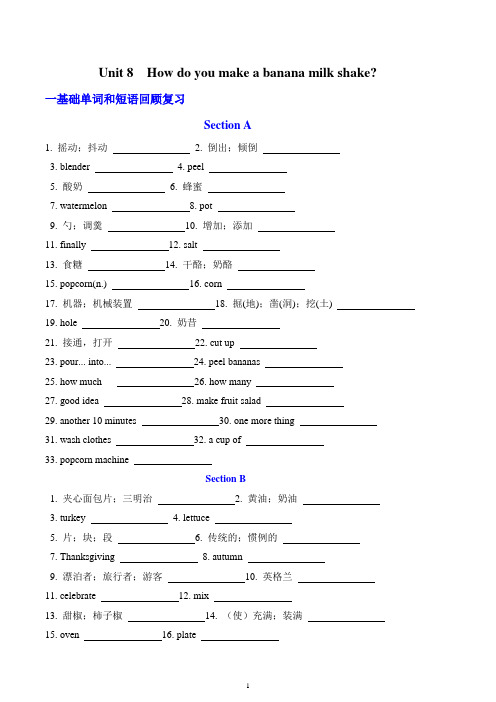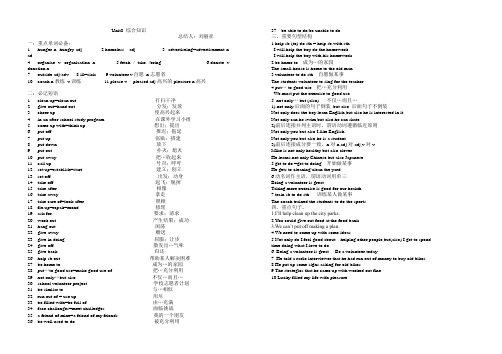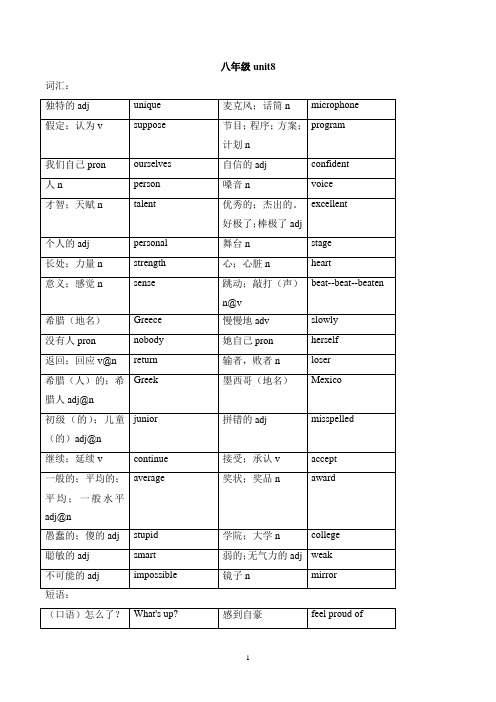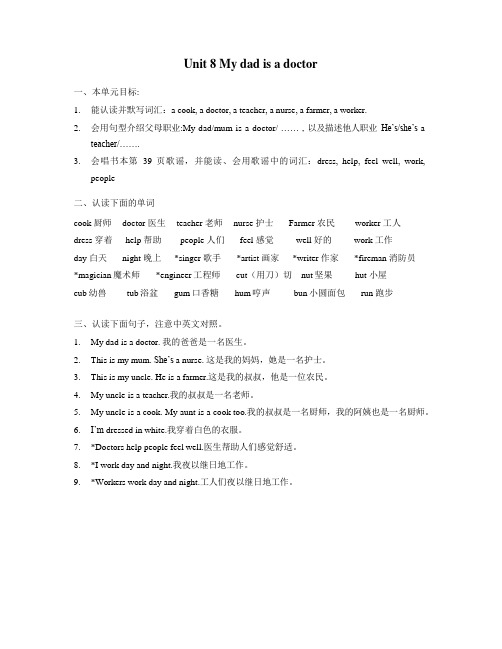Unit 8 知识点梳理
Unit8知识点总结

Unit 8 It must belong to Carla一、识记单词1.谁的whose2.卡车truck3.野餐picnic4.野兔rabbit5.出席attend6.贵重的valuable7.粉红色的pink8.任何人anybody9.声音,噪音noise10.男警察policeman11.狼wolf12.担心的,不安的uneasy13.实验室laboratory14.在户外outdoors15.外套coat16.困倦的sleepy17.着陆land18.外星人alien19.西服,套装suit20.表达express21.圆圈circle22.接受receive23.历史学家historian24.领导leader25.仲夏midsummer26.医疗的medical27.目的purpose28.阻止prevent29.力量energy30.位置position31.尊重honor32.祖宗ancestor33.胜利victory34.敌人enemy35.时期period36.努力工作的hard-working37.偷窃stole38.升起rise39.指point40. 神秘事件mystery二、识记短语1.同时at the same time2.追逐run after3.参加一个音乐会attend a concert4.有价值的东西something valuable5.被偷be stolen6.我剩下的朋友the rest of my friends7.捡起来pick up8.在音乐厅in the music hall9.彼此each other10.不平常的一些事something unusual 11.被采访be interviewed12.奇怪的声音strange noise13.其他的任何事anything else14.没主意have no idea15.将要发生be going to happen16.制造恐惧create fear17.指出point out18.医疗目的medical purpose19.保持人们健康keep people healthy20.一段很长的时间a long period of time21. 彼此 each other 22. 太…不… too...to...23. 天空中的东西something in the sky 24. 奇怪的东西something strange 25. 带相机的女人 a woman with a camera 26. 与...交流communicate with27. 放到特殊的位置put in a special position 28. 保持健康keep healthy29. 防止人们生病stop people from becoming ill 30. 邻里之间in the neighborhood三、句子中的重点语法讲解1.Whose volleyball is this? 这是谁的排球?【whose“谁的”,用于疑问句首,询问某物所属或其与何人何事有关。
Unit 8 知识清单人教版八年级英语上册

Unit 8 How do you make a banana milk shake? 一基础单词和短语回顾复习Section A1. 摇动;抖动2. 倒出;倾倒3. blender4. peel5. 酸奶6. 蜂蜜7. watermelon 8. pot9. 勺;调羹 10. 增加;添加11. finally 12. salt13. 食糖 14. 干酪;奶酪15. popcorn(n.) 16. corn17. 机器;机械装置 18. 掘(地);凿(洞);挖(土)19. hole 20. 奶昔21. 接通,打开 22. cut up23. pour... into... 24. peel bananas25. how much 26. how many27. good idea 28. make fruit salad29. another 10 minutes 30. one more thing31. wash clothes 32. a cup of33. popcorn machineSection B1. 夹心面包片;三明治2. 黄油;奶油3. turkey4. lettuce5. 片;块;段6. 传统的;惯例的7. Thanksgiving 8. autumn9. 漂泊者;旅行者;游客 10. 英格兰11. celebrate 12. mix13. 甜椒;柿子椒 14. (使)充满;装满15. oven 16. plate17. 遮盖;覆盖物 18. 接待;服务;提供19. gravy 20. temperature(n.)21. 一片面包 22. on special holidays23. 在11月的第四个星期四 24. one way to make turkey 25. 把火鸡切成薄片 26. cover...with...27. 用...装满 28. one by one29. 混合在一起 30. have a big meal二短语归纳milk shake turn on pour…into…a cup of yogurt a good ideaon Saturday cut up put…into… one more thing a piece ofat this timea fewfill… with…cover…with… one by onea long timehow many+可数名词复数how much+不可数名词It’s time (for sb.)+to do sth. First…Next…首先…接下来…Then…Finally…然后….最后…want + to do sth.forget+to do sth.how + to do sth.need+to do sth.make+宾语+形容词使……怎样let sb. +do sth.三语法讲解1. How do you make a banana milk shake? 怎样制作一份香蕉奶昔?解析:shake (n) 摇动;抖动(v)(使)摇动/颤抖过去式短语:shake off 抖落shake hands 握手shake one’s head 摇头for a shake 一瞬间饮用之前请摇一下瓶子。
八年级上册英语第8单元笔记

八年级上册英语第8单元笔记
以下是八年级上册英语第8单元的笔记,涵盖了本单元的重点词汇、短语、句型和语法知识点:
1. 重点词汇:
hurt 伤害,受伤
ankle 脚踝
knee 膝盖
elbow 肘部
head 头
cut 割伤,切伤
hurt oneself 受伤
2. 重点短语:
go to the hospital 去医院
be careful 当心,小心
be careful not to do sth. 当心不要做某事
be careful with sth. 对某事小心
3. 重点句型:
I hope you feel better soon. 我希望你很快好起来。
Don’t worry. It’s not serious. 别担心,不严重。
What should you do if you cut yourself? 如果割伤了自己,你应该怎么做?
4. 语法知识点:
现在进行时表示正在进行的动作或正在发生的事情,结构为“be + -ing”。
现在进行时的否定形式是在be动词后面加not,例如“I am not doing my homework”。
现在进行时的一般疑问句形式是在be动词前面加助动词“Are”,例如“Are you doing your homework?”。
5. 学习建议:
多听录音,模仿发音和语调。
多做笔记,积累词汇和短语。
多练习写作和口语,提高语言表达能力。
注意语法规则和句子结构,避免出现错误。
unit8 知识点总结

Unit8 综合知识总结人:刘丽亚一:重点单词必备:1. hunger n. hungry adj.2.homeless adj.3. advertiseing=advertisement n. ad.4. organize v. organization n.5.fetch / take /bring6.donate v. donation n.7. outside adj/adv 8.ill=sick 9.volunteer v.自愿n.志愿者10. coach n.教练v.训练11.please v. pleased adj.高兴的pleasure n.高兴二:必记短语1. clean up=clean out 打扫干净2. give out=hand out 分发;发放3. cheer up 使高兴起来4. in an after-school study program 在课外学习小组5. come up with=think up 想出;提出6. put off 推迟;拖延7. put up 张贴;搭建8. put down 放下9. put out 扑灭;熄灭10. put away 把…收起来11. call up 号召;呼吁12. set up=establish=start 建立;创立13. set off 出发;动身14. take off 起飞;脱掉15. take after 相像16. take away 拿走17. take care of=look after 照顾18. fix up=repair=mend 修理19. ask for 要求;请求20. work out 产生结果;成功21. hang out 闲荡22. give away 赠送23. give in doing 屈服;让步24. give off 散发出…气味25. give back 归还26. help sb out 帮助某人解决困难27. be home to 成为…的家园28. put…to good use=make good use of 把…充分利用29. not only…but also 不仅…而且…30. school volunteer project 学校志愿者计划31. be similar to 与…相似32. run out of = use up 用尽33. be filled with=be full of 由…充满34. face challenges=meet challedges 面临挑战35. a friend of mine=a friend of my friends 我的一个朋友36. be well used to do 被充分利用37. be able to do/be unable to do三、重要句型结构.1.help sb (to) do sth = help sb with sthI will help the boy do the homework.I will help the boy with his homework.2.be home to 成为…的家园The small house is home to the old man.3.volunteer to do sth 自愿做某事The students volunteer to sing for the teacher.4.put….to good use 把…充分利用We must put the exercise to good use.5. not only….but (also) 不仅…而且…1) not only后面的句子倒装but also 后面句子不倒装Not only does the boy learn English,but also he is interested in it.Not only can he swim,but also he can skate.2)前后连接并列主语时,谓语动词遵循临近原则Not only you but also I like English.Not only you but also he is a student.3)前后连接成分要一致,n对n,adj对adj,v对vMike is not only healthy but also clever.He learns not only Chinese but also Japanese.5.get to do =get to doing 开始做某事He gets to cleaning/clean the yard.6.动名词作主语,谓语动词用单三Being a volunteer is great.Taking more exercise is good for our heakth.7.train sb to do sth 训练某人做某事The coach trained the students to do the sports.四、重点句子。
(完整word版)Unit8ItmustbelongtoCarla知识点整理

Unit 8 It must belong to Carla.语法情态动词表推测一.情态动词的用法有很多,其中表示推测是其重要用法之一.可以用来表示推测的情态动词主要有must, may, might, can, could,情态动词表示推测可以分为以下几种情况:1.情态动词+do表示对现在或将来情况的推测和判断:He must be in yourroom.2.情态动词+have done表示对过去情况的推测和判断:The road is wet,It must have rained last night.3.情态动词+be doing表示对现在或将来正在讲行的情况的推测和判断: At thismoment,my father can ' t be working in the office.二.must, may, might, can, could表示推测时含义有所不同m must肯帘" (100啕可能性)may, might, could 有可能、也许” (20% —80%的可能性)can' t不可能、不会”世能性几乎为零)注意:表示推测是can不用于肯定句中,肯定句中表示“可能” 用may/might/ could.The dictionary must be mine. It has my name on it.The CD might/could/may belong to Tony because he likes listening to pop music.The hair band can' t beob' s. After all, he is boy!(1)— Wheres Jeff? —I'm not sure. He be playing football on theplayground.A. needB. mightC. mustD.can(2)He come and see you next week.But I ' m not sure.A.mightB.mustC.need(3)—Tom,go to answer the door,please.It be your Mom.—No,Dad.It be herShe will be back after three o ' clock.A.may;mustn 'B.must;can ' tC.must;mustn ' t(4)Henry be at home,because he phoned me from Beijing just now.A.mustn 'B.can ' tC.must(5)—Where is Jack,please?I ' m suree be in the reading room. A.can B.might C.must(6)The short girl be Alice.She is of medium height.A.mustn 'B.can ' tC.may not⑺一Whose book is this?— It be Lusys. Her name is on it.A .could B. can ' t C. must D. might根据句意,用适当的情态动词填空I.She ___________________ know the answer,but I ' m not sure.2.Li Ming be in Shanghai,because he has gone to Hangzhou.3.Don' t play with the knife.You hurt yourself.4.A teacher also make a mistake if he or she is not carefulenough.5.Oh,dear! You have walked so long on such a hot day!You be tired andthirsty.6.—Who is the man over there? Is it Mr Wang?—No,it be him.Mr Wang has curly hair.7.They saw something in the sky last night.U ___________________ a UFO.8.Yao Lei said he late,but he came on time.Section A1. must的用法(1)must表示推测时,意为“一定”,通常与be连用,只用于肯定句中。
Unit 8 知识点总结

八年级unit8词汇:独特的adj unique 麦克风;话筒n microphoneprogram假定;认为v suppose 节目;程序;方案;计划n我们自己pron ourselves 自信的adj confident人n person 嗓音n voiceexcellent才智;天赋n talent 优秀的;杰出的。
好极了;棒极了adj个人的adj personal 舞台n stage长处;力量n strength 心;心脏n heartbeat--beat--beaten 意义;感觉n sense 跳动;敲打(声)n@v希腊(地名)Greece 慢慢地adv slowly没有人pron nobody 她自己pron herself返回;回应v@n return 输者,败者n loserGreek 墨西哥(地名)Mexico希腊(人)的;希腊人adj@njunior 拼错的adj misspelled初级(的);儿童(的)adj@n继续;延续v continue 接受;承认v acceptaverage 奖状;奖品n award一般的;平均的;平均;一般水平adj@n愚蠢的;傻的adj stupid 学院;大学n college聪敏的adj smart 弱的;无气力的adj weak不可能的adj impossible 镜子n mirror(口语)怎么了?What's up? 感到自豪feel proud of有什么事吗?近来怎么样?应该;被期望be supposed to 相信自己believe in yourself 有道理;有意义make sense 熟能生巧practice makesperfect乐意效劳It's my pleasure 单独;独自by oneself继续做...... continue doing/todo 进步最快学生奖most_improvedstudent award优点;强项strong points 因为because of弱点;弱项weak points 单独;独自by oneself梦想成为...... dream of being... 去了某地have gone to... 去过...... have been to... 仔细考虑;重新考虑think over七年半seven and a halfyears 七年半seven years and ahalfWhat's wrong with you? 你怎么了?What's the matter/trouble with you? 你怎么了?2.be supposed to do sth=should do sth“应该,认为应该,被期望”They were supposed to be here an hour ago.他们应该在一小时以前到达这里。
初中英语Unit8知识点

Unit8 Section A1.现在完成时的句型结构肯定句:主语+have/has+done否定句:主语+have/has+not+done have not=haven’t/has not=hasn’t疑问句:have/has+主语+done肯定回答:Yes,主语+have/has否定回答:No,主语+have/has not2.现在完成时的用法(含义)(1)表示过去发生的动作对现在造成的影响或结果(2)表示从某一个时间开始,一直持续到现在的动作或状态(也许还要继续持续下去)常与since或for引导的时间状语连用3.现在完成时的标志词:already,yet,just,since+时间点/时间段+ago/一般过去时句子,for+时间段,ever,never, once,twice,three times等表次数的时间状语4.already常用于肯定句中,一般用于have/has后,实意动词之前yet多用于否定句(译为“还”)和疑问句(译为“已经”)一般放句末在现在完成时的句子中,含有already的肯定句变否定句或疑问句时,already变yet,并放在句末5.full of “满是…的,有大量的” be full of… “装满…的”fill v. fill A with B “用B把A装满” be filled with “充满…”=be full of6.put down “放下写下记下”,动+副词组,代词放中间7.hurry up “赶快” = come on / be quick ; “匆忙” in a hurry8.due adj. “预期,预定”,通常只做表语; be due to do sth.预定做某事9.in two weeks 两周之后“in+时间段”常与一般将来时连用,对其提问时,用how soon10.arrive in+大地点arrive at+小地点; arrive on this island到达这个岛11.“其他的另外的”(2个)else:疑问词/不定代词+else Who else was there?other:other+名词Do you have any other questions?12.one…the other (两个中的)一个…另一个eg: She has two daughters. One is a teacher, the others is a doctor.some…others 一些…另一些(指代在一定范围内除去一部分后的剩余部分,但不是剩余的全部)eg: Some people like swimming, others like fishing and others like boating.the others一定范围内,除去一部分,剩余的全部eg: There are 40 books in the box.10 are mine, and the others are his.another “另一;又一” 泛指三者或三者以上eg: I don’t like this one. Please give me another.other “别的;其他的” 作形容词修饰名词eg:What other animals do you like?13.in the middle of 在…的中间14.can’t wait to do sth. 迫不及待做某事;can’t help doing sth.情不自禁做某事15.教某人某事teach sb. sth. eg: Mr. Chen teaches us English.16.一些喝的东西something to drinkUnit8 Section B1.teenage adj. “十几岁的” teenager n. “十几岁的青少年”2.听汤姆乐队演奏是个提神的好方法。
八年级上册英语unit8详细知识点

八年级上册英语unit8详细知识点Unit 8: At the weekends八年级上册英语 unit 8 详细知识点Unit 8 is all about talking about how people spend their weekends or free time. In this unit, you will learn different activities that people do on weekends along with their preferences. The unit involves different vocabulary, grammar, reading, writing, and speaking exercises.词汇 (Vocabulary)1. prefer (v) – to like something more than others2. outdoor (adj) – related to the outside or outdoors3. indoor (adj) – related to the inside or indoors4. watch (v) – to look at something carefully, especially a movie ora TV show5. attend (v) – to go to an event or a place6. involve (v) – to be a part of or to include something7. practice (v) – to do something repeatedly to get better at it8. recent (adj) – happening or done not long ago9. basically (adv) – in a simple way, without unnecessary details10. participate (v) – to take part in an activity or event语法 (Grammar)1. Simple Present TenseThe simple present tense is used to talk about things that you do regularly or things that are true in general.Example: I usually sleep till late on Sundays.2. Adverbs of FrequencyAdverbs of frequency are used to talk about how often something happens.Examples:- I always go to the gym on Saturdays.- She never misses her dance classes.3. Present Continuous TensePresent continuous tense is used to talk about things that are happening right now or things that are in progress.Example: We are playing basketball at the park right now.4. How to ask and answer about weekend activitiesAsking:- What are you doing this weekend?- What do you usually do on Sundays?- How do you spend your free time?Answering:- I like to watch movies on weekends.- I usually play video games with my friends.- We like to go for a picnic in the park.阅读 (Reading)Reading exercises are given in the form of passages or short stories. The passages can involve different themes related to weekend activities.写作 (Writing)In Unit 8, you will be asked to write different types of short paragraphs or essays related to weekend activities. You will need to use proper vocabulary and sentence structures to convey your ideas effectively.口语 (Speaking)In the speaking exercises, you will be asked to talk about different activities that you like or dislike doing on weekends. You will need to use proper sentence structures and vocabulary to convey your ideas effectively. Additionally, you will be asked to engage in conversations with your classmates to demonstrate your speaking abilities.总结 (Conclusion)In conclusion, Unit 8 of the 8th grade English book is all about weekend activities and how to talk about them in English. With proper understanding and practice of vocabulary, grammar, reading, writing, and speaking exercises, you can easily master this unit and improve your English communication skills.。
八年级上册英语第八单元知识点

八年级上册英语第八单元知识点以下是八年级上册英语第八单元的知识点,包括重点单词、短语、句型和语法等:1. 重点单词:邀请:invite接受:accept拒绝:refuse计划:plan举行:hold地点:place野餐:picnic聚会:party2. 重点短语:接受邀请:accept the invitation拒绝邀请:refuse the invitation举行聚会:hold a party在哪里举行:where to hold3. 重点句型:我已经邀请了一些朋友在下个星期六去我家。
I have invited some friends to my home next Saturday.她接受了邀请,并计划在周末举行一个聚会。
She accepted the invitation and plans to hold a party at the weekend.我们需要考虑在哪里举行这个聚会。
We need to think about where to hold the party.4. 语法重点:现在完成时的用法,表示过去发生的动作对现在的影响或结果。
现在完成进行时的用法,表示从过去某时开始一直持续到现在的动作,强调动作的延续性。
5. 交际用语:邀请别人参加聚会或活动时,可以使用“Would you like to come to my party/event?”。
接受邀请时,可以说“Yes, I would love to!”。
拒绝邀请时,可以说“I'm sorry, I can't come.”。
通过以上知识点的梳理,希望能帮助学生更好地掌握八年级上册英语第八单元的内容。
英语八年级下册unit8知识点

英语八年级下册unit8知识点英语八年级下册unit 8主要学习了关于旅游的知识,以下是本单元的知识点总结。
1. 关于旅游的动词go sightseeing 游览take photos 拍照visit museums 参观博物馆go hiking 远足ride bikes 骑自行车relax 放松swim 游泳2. 关于旅游的名词national parks 国家公园beach 海滩mountains 山museums 博物馆zoo 动物园historic sites 历史遗址souvenirs 纪念品3. 询问旅游计划的句子Where are you going? 你去哪里?What are you going to do there? 你打算在那儿做什么? How long are you staying there? 你在那儿呆多久?Who are you going with? 你和谁一起去?4. 讨论旅游经验的句子How was your trip? 你的旅行怎么样?Did you enjoy your trip? 你旅行的时候玩得开心吗?What was your favorite part? 最喜欢的部分是什么?Did you take any photos? 你拍了照片吗?5. 描述目的地的句子It’s a great place to visit. 这是一处非常值得游览的地方。
There are many interesting things to do there. 那里有很多有趣的事情可以做。
The scenery is breathtaking. 风景令人惊叹。
The food is delicious. 食物非常美味。
6. 表示喜欢或不喜欢的句子I love/like... 我喜欢……I don’t like... 我不喜欢……I hate... 我讨厌……此外,本单元还学习了一些口语交际技巧和写作技巧,比如如何尊重当地文化和习俗,如何写旅游日记和邮件等。
unit8八年级上册知识点

unit8八年级上册知识点在八年级的第八个单元中,我们将学习一些关于如何描述过去事件的知识点,以及如何表达意愿和建议。
以下为本单元的详细内容:一、过去事件的描述方法1.过去式的构成过去式的构成方式主要分为三大类:加-ed,变元音和不规律变化。
例如:watch—watched,buy—bought,swim—swam。
2.过去进行时的构成过去进行时表示在过去某一时间段正在进行的动作,构成方式为was/were + doing。
例如:I was reading a book at that time.(那个时候我正在看书。
)3.过去完成时的构成过去完成时表示在过去的某个时间点已经完成的动作,构成方式为had + 动词的过去分词。
例如:I had finished my homework before my parents arrived.(我的父母到之前我已经做完了作业。
)二、意愿和建议的表达方式1.情态动词should的用法should表示应该,常用于表达建议、命令或提供意见。
例如:You should get some rest.(你应该休息一下。
)2.情态动词could的用法could表示能够,也可用于表示建议。
例如:You could go to the library to study.(你可以去图书馆学习。
)3.情态动词would的用法would表示愿意,常用于表示请求或征求意见。
例如:Would you help me carry the boxes?(你能帮我搬一下箱子吗?)以上就是八年级上册第八单元的全部知识点,希望同学们能够认真学习掌握,提高自己的英语水平。
八年级上册u8笔记

八年级上册u8笔记
以下是八年级上册Unit 8的笔记,供您参考:
1. 重点单词:掌握课本中的重点单词,包括它们的拼写、发音和用法。
2. 语法点:掌握一般现在时、现在进行时和一般过去时的用法,特别是动词的第三人称单数形式和动词的-ing形式。
3. 常用表达法:掌握一些常用的表达法,如询问对方正在做什么,询问对方是否在做某事等。
4. 课文理解:理解课文中的对话和短文,掌握其中的重点词汇和表达法。
5. 练习巩固:通过练习巩固所学知识,提高自己的语言运用能力。
6. 听力训练:通过听力训练提高自己的听力水平,掌握一些常用的听力技巧。
7. 口语训练:通过口语训练提高自己的口语表达能力,掌握一些常用的口语表达方式。
以上是Unit 8的主要学习内容,建议您在学习过程中认真听讲,及时总结
笔记,多做练习,提高自己的语言运用能力。
UNIT 8知识点总结

第八单元单词、短语、重点句、反身代词的 用法
黑体单词
suppose 假定;认为 ourselves 我们自己 person 人 personal 个人的 sense 意义;感觉 nobody 没有人 return 返回;回应
continue 继续;延续 stupid 愚蠢的;傻的 smart 聪敏的 impossible 不可能的 weak 弱的;无气力的 program 节目;程序;方案;计划 voice 嗓音
excellent 优秀的;杰出的;好极了;棒极了 heart 心;心脏 beat 跳动;敲打(声) herself 她自己 fail 不及格;失败 accept 接受;承认 college 学院;大学
短语句式
laugh at sb 嘲笑某人 return to+sp 返回某地 lose to sb 输给某人 be proud of sb 为某人感到自豪/骄傲 make sense 有道理;有意义 come from 来自 seven and a half ystake 犯错误
译林版三年级上 Unit8 知识点梳理

Unit 8 Happy New Year一、单词1、基础词汇a doll 一个洋娃娃 a ball 一个球 a CD 一张光盘a car 一辆汽车 a robot 一个机器人birthday 生日all 全部this 这个that 那个happy 开心的toy 玩具uncle 叔叔new 新的year 年New Year 新年2、拓展词汇my box 我的盒子 a nice football 一个漂亮的足球a toy car 一辆玩具汽车 a toy puppy 一个玩具小狗a green hankle 一块绿色的手帕 a plastic puppet 一个塑料的木偶two new dolls 两个新的洋娃娃three colourful balls 三个五颜六色的球for you (me,him,her,it,them)给你/我/他/她/它/他们for you mother 给你的妈妈二、句型基础句子1、Happy New Year,Uncle John. 约翰叔叔,新年快乐2. -Happy birthday,Booby! ——波比,生日快乐!-Thank you. ——谢谢。
3.- What’s this?-It’s a doll. ——这是什么?——这是一个洋娃娃。
4.- What’s that? -It’s a ball. ——那是什么?——那是一个球5.It’s for Tim. 它是给蒂姆的。
6.This toy car is for you. 这个玩具汽车是给你的。
7.We are singing.We are dancing. 我们唱歌。
我们跳舞。
8.Happy New Year to you all. 祝你们都新年快乐。
拓展句子1.I s it nice? 它好看吗?2.T hat is for me. 那是给我的3.–Do you like CDS? ——你喜欢光盘吗?-Yes,I do./No,I don’t.——是的,我喜欢。
Unit8知识点

Unit81.cheer (sb.) up 使(某人)高兴、振作如:cheer me up 使我高兴 clean up 打扫 clean-up n. 打扫2. hand out 分发3. sick adj. 生病的作表语、定语 ill adj. 生病的作表语,不能作定语4. volunteer to do v. 志愿效劳、主动贡献 volunteer n. 志愿者5. come up with 提出想出 === think up 想出6.catch up with 赶上追上7. put off doing 推迟做某事 put on 穿上 (指过程) put up 张贴8. call up 打电话 make a telephone call 打电话9. put …to use 把… 投入使用,利用 They put the new machine to use. 他们把新机器投入使用10.not only … but (also) … 不但… 而且… 用来连接两个并列的成分11. join 参加 (指参加团体、组织) 如:join the Party 入党take part in 参加 (指参加活动) 如:take part in sports meeting 参加运动会12. ①run out of == use up 用完用尽②run away 逃跑 The monkey has run away from the zoo.③run to + 地方跑到某地13. take after (在外貌、性格等方面)与(父母等)相像 be similar to 与..相像14. work out 算出结局15. hang out 闲荡闲逛16. be able to do 能会 be unable to do 不能不会17. thank you for doing 谢谢做某事18. for sure 确实如此,毫无疑问You don’t have money. That’s for sure. 你没有钱,这是毫无疑问的。
Unit8 知识点梳理-译林版二年级上

Unit 8 My dad is a doctor一、本单元目标:1.能认读并默写词汇:a cook, a doctor, a teacher, a nurse, a farmer, a worker.2.会用句型介绍父母职业:My dad/mum is a doctor/ …… , 以及描述他人职业He’s/she’s ateacher/…….3.会唱书本第39 页歌谣,并能读、会用歌谣中的词汇:dress, help, feel well, work,people二、认读下面的单词cook 厨师doctor 医生teacher 老师nurse 护士Farmer 农民worker 工人dress 穿着help 帮助people 人们feel 感觉well 好的work 工作day 白天night 晚上*singer 歌手*artist 画家*writer 作家*fireman 消防员*magician 魔术师*engineer 工程师cut(用刀)切nut 坚果hut 小屋cub 幼兽tub 浴盆gum 口香糖hum 哼声bun 小圆面包run 跑步三、认读下面句子,注意中英文对照。
1.My dad is a doctor. 我的爸爸是一名医生。
2.This is my mum. She’s a nurse. 这是我的妈妈,她是一名护士。
3.This is my uncle. He is a farmer.这是我的叔叔,他是一位农民。
4.My uncle is a teacher.我的叔叔是一名老师。
5.My uncle is a cook. My aunt is a cook too.我的叔叔是一名厨师,我的阿姨也是一名厨师。
6.I’m dressed in white.我穿着白色的衣服。
7.*Doctors help people feel well.医生帮助人们感觉舒适。
8.*I work day and night.我夜以继日地工作。
- 1、下载文档前请自行甄别文档内容的完整性,平台不提供额外的编辑、内容补充、找答案等附加服务。
- 2、"仅部分预览"的文档,不可在线预览部分如存在完整性等问题,可反馈申请退款(可完整预览的文档不适用该条件!)。
- 3、如文档侵犯您的权益,请联系客服反馈,我们会尽快为您处理(人工客服工作时间:9:00-18:30)。
Unit 8 How do you make a banana milk shake?一、词组、短语:1、milk shake 奶昔,2、Peel 剥drink 喝3、turn on打开,turn off 关闭turn up 调大turn down 关小4、pour into 倒入,put--in 把--放入5、a cup of yogurt 一杯酸奶,6、cook --for 煮---7、cut up 切碎,8、first,next,then,finally 首先,接下来,然后,最后9、one more thing 还有一件事,10、eat traditional food 吃传统的食物11、on special holidays 在特别的假期12、at this time在此时13、fill…with… 用…装满,14、cover…with… 用…盖住,15、one by one一个接一个,16、a long time长时间,17、a piece of一片/一张/一块,18、a few 几个19、cut sth into pieces 把某物切成碎片20、add--to 把--加到--二、习惯用法、搭配1、How many + 可数名词复数2、How much + 不可数名词,3、let sb. do sth.让某人做某事,4、want to do sth.想要做某事,5、forget to do sth. 忘记要做的事情,6、how to do sth.怎样做某事,7、There are many reasons for 某事有几个原因/理由,8、一段时间+ago 用于一般过去时态9、by doing sth. 通过做某事10、need to do sth. 需要做某事,11、make + 宾语+ 形容词使某人---12、It’s time(for sb) to do sth某人该做某事的时间到了。
13、First…Next…Then…Finally…首先,接下来,然后,最后三、重要句子1、How do you make a banana milk shake?你怎样做香蕉奶昔?Turn on the blender.启动搅拌器,2、How many bananas do we need? 我们需要几个香蕉?3、How much yogurt do we need?我们需要多少酸奶?4、Now, it’s time to enjoy the rice noodles!啊,该品尝大米面条。
5、语法句子:How do you make a banana milk shake? First, peel the banana. Next, put the banana in the blender. Then, pour the milk into the blender.and turn on the blender.Finally, drink it.Countable nouns Uncountable nounsHow many bananas do we need? How much yogurt do we need?We need three bananas. We need one cup of yogurt.四、词语辨析1、turn on 打开,接通(电源,气,水),反义词是turn off. turn up/turn down 调高/低音量。
1.pour…into… 将…倒入/灌入… into 是:进入… in 是:在…内。
在put, throw, break, lay, fall 等动词之后,既可用in,也可用into。
但in可作副词,into不能。
He put all the books in/into the bag. Come in!请进!3. 有关make 的短语:make the bed 铺床,make tea沏茶,make trouble 惹麻烦,make money 赚钱,make a decision 做决定,make a telephone call 打电话,make a visit 拜访,make a mistake 犯错误,make a noise 弄出噪音,make a living 谋生,make sure 务必4. one more thing = another one thing 基数词+ more + 名词= another + 基数词+ 名词5. fill with 用…填充… be filled with = be full of 充满….The boy filled the bottle with sand. / The bag was full of clothes.6. cover…with… 用…把…覆盖be covered with 被…所覆盖。
cover n. 封面,盖子。
Ann covered her face with her hands. / The cover of the magazine is nice.7. It’s time (for sb) to do sth. 到某人做某事的时候了。
It’s time for sth. 到做某事的时候了。
8、主谓一致用法:①不可数名词作主语时,谓语动词用单数。
②动名词或动词不定式作主语时,谓语动词用单数形式。
③either…or…, neither…nor…, not only…but also..连接两个名词或代词作主语时,谓语动词与邻近的名词或代词在人称和数上保持一致。
④表示时间,重量,数目,价格,长度,数学运算等的词或短语作主语时,尽管他们是复数形式,但如果把这些复数形式的词或短语看作是一个整体,谓语动词用单数形式。
Two months is quite a long time. Twenty dollars is enough.⑤动词不定式,动名词,从句或不可数名词作主语时,谓语动词用单数。
To see i s to believe. It is not easy to master a foreign language.⑥由and连接两个成分作主语时,要根据其表示的意义来决定谓语动词的形式。
如果其表示的是一个整体的概念或指的是同一事物,谓语动词用单数,如果其表示的是两个不同的对象时,谓语动词用复数。
The writer and the teacher are coming.The poet and teacher is one of my friends.⑦集合名词people,police一般看作复数意义,其谓语动词用复数。
另外一些集合名词f amily,class 等作主语时,谓语动词是用单数还是复数,要根据这些词在句中的实际含义而定。
当他们表示的是整体意义时,谓语用单数;当他们强调个体成员时,谓语动词用复数形式。
In England, people eat fish and chips.The Chinese people(民族)is a great people,but the Chinese people are brave and hard-working people.中华民族是个伟大的民族,而中国人民是勤劳勇敢的。
⑧名词性物主代词mine,yours,his,hers,its,ours,theirs等作主语时,谓语动词的数取决于该代词所表示的意义是单数还是复数。
His parents are young, but mine are old.⑨以s结尾的名词本身不表示复数意义时,谓语动词通常用单数形式,如news,physics,politics 等。
No news is good news. Physics is the most difficult subject for him.⑩由or,either…or…,neither…nor…,no t only…but also…等词连接名词或代词作主语时,谓语动词的数和最接近的主语一致。
Neither you nor Li Hua has been to Shanghai before.11以there,here开头的句子,若主语不止一个,其谓语动词的形式和邻近的那个主语一致。
There is a table and four chairs in the room.Here are some books and paper for you.12trousers,clothes,glasses,compasses,chopsticks等作主语时,谓语动词用复数。
但如果前面有a pair of短语时,谓语动词用单数。
Jim’s trousers are brown. The pair of glasses is Mr. Green’s.13由“a lot of/lots of/plenty of+名词”或“分数+名词”作主语时,谓语动词的单复数根据名词的单复数而定。
A lot of people have been to London.Three-fifths of the water is dirty.14“a number of +复数名词”作主语时,谓语动词用复数;“the number of+复数名词”作主语时,谓语动词用单数。
A great number of birds fly to the south in winter.The number of lions does not change much if people leave things as they are.15代词something,anything,nothing,everyone,anybody,nobody,each,neither,either,little,much,one等作主语时,谓语动词用单数形式。
Neither of us is a boy。
Each of them has an English dictionary。
One of the students was late for school。
16All,some none,most,any等代词作主语时,若其指复数概念,谓语动词用复数形式;若其指单数形式,则谓语动词用单数形式。
Not all work is difficult。
Not all the students are here。
17有些形容词前面加上定冠词the,如the poor,the old,the yong,the rich,the dying等用来表示一类人时,主语为复数意义,谓语动词用复数。
